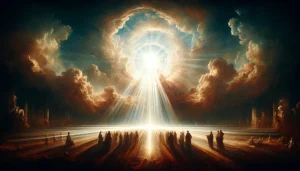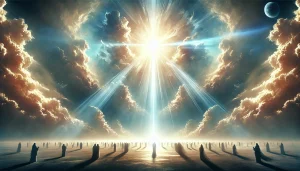
Language
וַיַּ֣עַשׂ (and made )עָשָׂה (to make) differs fromבָּרָא (to create) as used in Genesis 1:1. It’s reasonable to suggest thatבָּרָא indicates creation from nothing (ex nihilo) and is uniquely associated with divine action, whileעָשָׂה emphasizes fashioning or forming from pre-existing materials and is not exclusively divine. In many verses, they seemed to be used interchangeably.- Genesis 2:4, “These are the generations of the heavens and the earth when they were created (
בָּרָא ), in the day that the LORD God made (עָשָׂה ) the earth and the heavens.” - Genesis 1:26-27, “Then God said, ‘Let Us make (
עָשָׂה ) man in Our image, after Our likeness… So God created (בָּרָא ) man in His own image, in the image of God He created him; male and female He created them.”
- Genesis 2:4, “These are the generations of the heavens and the earth when they were created (
אֱלֹהִ֔ים (God )- Exodus 3:14, “God said to Moses, ‘I AM WHO I AM.'”
הָרָקִיעַ (the expanse )רָקִיעַ refers to the “expanse” or “firmament,” considered the sky or heaven that separates waters from waters. In ancient Near Eastern thought, this was often envisioned as a solid dome.- Psalms 150:1, “Praise the LORD! Praise God in his sanctuary; praise him in his mighty expanse!”
וַיַּבְדֵּ֗ל (and separated )בָּדַל means “to separate” or “to divide,” reflecting the intentional order in creation and a concept of space and order, with the symbolic meanings of sanctification or setting something apart for a special purpose.- Genesis 1:4, “And God saw that the light was good. And God separated the light from the darkness.”
- Leviticus 20:26, “You shall be holy to me, for I the LORD am holy and have separated you from the peoples, that you should be mine.”
הַמַּ֙יִם֙ (waters )מֵֽים (waters) has a dual form, emphasizing its complex nature. It may represent both life-sustaining force and chaotic power (in ancient literature). The separation of “waters from waters” symbolizes God’s control over the chaotic elements, making the world habitable.- Proverbs 8:29, “when he assigned to the sea its limit, so that the waters might not transgress his command, when he marked out the foundations of the earth,”
מִתַּ֣חַת (from under ) andמֵעַ֖ל (from above )תַּחַת means “Under” or “beneath,” andעַל means “above” or “to go up,” both in a literal and metaphorical sense. These terms convey not just spatial orientation but a deeper theological message about God’s intentional ordering of the universe.- Exodus 20:4, “You shall not make for yourself a carved image, or any likeness of anything that is in heaven above, or that is in the earth beneath (under), or that is in the water under the earth.”
וַֽיְהִי־כֵֽן (and it was so )- Lamentations 3:37, “Who has spoken and it came to pass, unless the Lord has commanded it?”
Create vs. MakeIn the Hebrew Bible, the verbs
בָּרָא (to create) andעָשָׂה (to make) may be interchangeable but not entirely, although they are closely related; both describe divine creative activities but can convey different nuances. The distinction is not difficult to understand; even in English, the verbs “create” and “make” can be used interchangeably in some contexts but not in all. If different terms are employed by the author Moses under divine inspiration, there must be a purpose…[Read More]
Insights
- Separation and Order: Calvin emphasizes that the “firmament,” or “expanse,” serves to separate the heavens from the earth, maintaining order. For him, the mixing of heaven and earth would signify the utmost disorder, highlighting the importance of this division.
- Literal Interpretation: Calvin insists that the text speaks to the “visible form of the world” and is not allegorical. He states that those who seek deeper astronomical or scientific interpretations should look elsewhere. This passage serves as a “book for the unlearned,” explaining the world in terms accessible to all.
- Waters and Clouds: Calvin addresses the “waters above the heavens,” taking them to be the clouds. He sees these waters as a manifestation of God’s providence, kept from overwhelming the earth by God’s will. He notes that these clouds are suspended and separated by “liquid and yielding air,” demonstrating God’s control.
- Providence and Protection: Calvin draws attention to the miraculous aspect of God’s control over the natural elements. He cites the example of the deluge (the Great Flood) to indicate what could happen if God did not control the barriers between the waters and the earth.
- Limitation and Control: Calvin concludes by mentioning that God’s note of approval (“it was good”) is not attached to the creation of the firmament, possibly because its full purpose was not realized until the gathering of terrestrial waters on the next day. This emphasizes God’s intentional, step-by-step creation process.
John Calvin: “Moses describes the special use of this expanse, ‘to divide the waters from the waters,’ from which word arises a great difficulty. For it appears opposed to common sense, and quite incredible, that there should be waters above the heaven. Hence some resort to allegory, and philosophize concerning angels; but quite beside the purpose. For, to my mind, this is a certain principle, that nothing is here treated of but the visible form of the world. He who would learn astronomy, and other recondite arts, let him go elsewhere.” (Commentary excerpt)
Cross-References
- Genesis 7:11-12, “In the six hundredth year of Noah’s life, in the second month, on the seventeenth day of the month, on that day all the fountains of the great deep burst forth, and the windows of the heavens were opened. And rain fell upon the earth forty days and forty nights.”
- This verse serves as a counterpoint to Genesis 1:7. Whereas Genesis 1:7 speaks of God’s separation of the waters to create order, Genesis 7:11-12 discusses how these waters were later released in the Flood, pointing to both the sustaining and destructive power of the waters that God originally separated.
- Genesis 1:14-19, “And God said, ‘Let there be lights in the expanse of the heavens to separate the day from the night. And let them be for signs and for seasons, and for days and years,’ … And it was so.”
- Genesis 1:14-19 is directly related to Genesis 1:7 in that both discuss the “expanse,” also referred to as the “heavens.” In Genesis 1:7, God creates this expanse to separate the waters below from the waters above. Genesis 1:14-19 goes on to elaborate on what fills this expanse.
- Job 26:7-10, “He stretches out the north over the void and hangs the earth on nothing. He binds up the waters in his thick clouds, and the cloud is not split open under them. … He has inscribed a circle on the face of the waters at the boundary between light and darkness.”
- In this passage, the act of “stretching out” and “binding up the waters” correlates with Genesis 1:7, where God separates the waters above from those below.
- Exodus 20:11, “For in six days the LORD made heaven and earth, the sea, and all that is in them, and rested on the seventh day. Therefore the LORD blessed the Sabbath day and made it holy.”
- In this verse, the act of the LORD is reiterated, underlining the same elements that are divided and organized in Genesis 1:7. The mention of the six days in Exodus also ties back to the time frame set forth in Genesis 1, reinforcing the notion that God’s creation was both intentional and orderly.
- 2 Peter 3:5-6, “For they deliberately overlook this fact, that the heavens existed long ago, and the earth was formed out of water and through water by the word of God, and that by means of these the world that then existed was deluged with water and perished.”
- The verses in 2 Peter highlight the crucial role that water plays in God’s creation, mirroring Genesis 1:7’s account of the separation of waters to form the sky and the sea. The verses also mention that the earth was “formed out of water and through water by the word of God,” which aligns with the description of God’s command in Genesis.
Matthew Henry: “What God requires of us he himself works in us, or it is not done. He that commands faith, holiness, and love, creates them by the power of his grace going along with his word, that he may have all the praise. Lord, give what thou commandest, and then command what thou pleasest. The firmament is said to be the work of God’s fingers (Psalm 8:3). […] O what a great God is he who has thus provided for the comfort of all that serve him and the confusion of all that hate him! It is good having him our friend, and bad having him our enemy.” (Commentary excerpt)




